.jpg)
Tōfā mamao means navigating the future guided by the past.
We are a grassroots collective of tagata sa’ilimalo (Pacific disabled people, their families/nofo-a-kainga, and carers/supporters/tautua soifua in Aotearoa). As a proudly independent national non-profit led entirely by tagata sa’ilimalo, we play a unique role in advancing the voice of lived experience from a Pacific and collectivist worldview
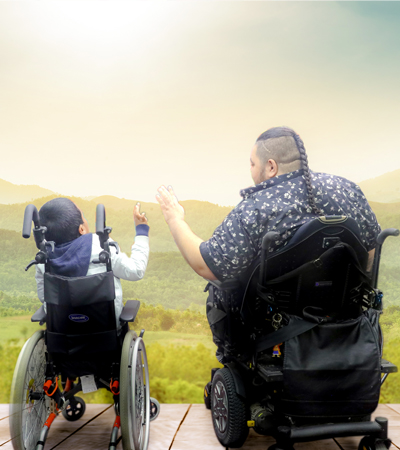
Tagata Sa’ilimalo (tagata = people or person, sa’ilimalo = pursuit of success) is a new vision of Pacific disability in Aotearoa and also a term of identity to replace “Pacific disabled people, their families, and carers/supporters.”
Tagata Sa’ilimalo is an aspirational vision of the pursuit of success underpinned by sheer determination and sustained by the collective vitality of Pacific peoples. It is a vision that reflects the hopes of the disability community to imagine better for their future.
The Tagata Sa’ilimalo vision is inclusive of all Pacific peoples in Aotearoa and all disability types. The name derives from a Sāmoan phrase, but we anticipate additional names will be developed in other Pacific languages to describe the same underlying vision.
The origin of the name is a phrase used to acknowledge an individual or group’s victory or achievement: malo le sa’ili malo, malo le finau, malo le tauivi. In English this means well done for pursuing success, well done for raising and arguing the point, well done for persevering with the struggle. This expression allows those who have witnessed or taken part in the successful journey to recognize everything it took to get there.
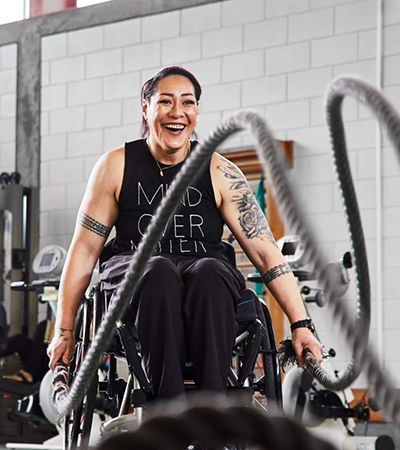
Tagata sa’ilimalo are one and many. Tagata sa’ilimalo refers not only to an individual, but also to the family and community who surround them.
As members of a family collective, tagata sa’ilimalo both give and receive support. As members of the Pacific community, tagata sa’ilimalo participate in a resilient and agile network of people and organizations working together while connected by shared values, practices, and community. We call this way of working the tagata pasifika ecosystem. It is a system that mobilises the community to achieve outcomes for Pacific people and in so doing contributes to the prosperity of all peoples in Aotearoa New Zealand.
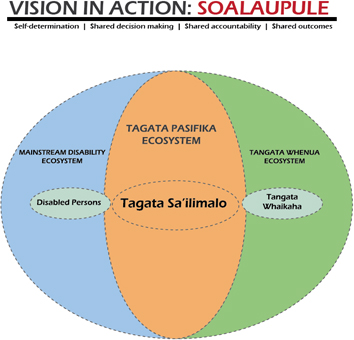
Soalaupule (shared authority) is the name of our vision in action that will guide changing practices. Soalaupule is a group decision-making process in which participants share both the decision and accountability for the outcomes. Soalaupule allows self-determination while intertwining the lives of everyone who takes part.
The Soalaupule model below is a systems representation centered on tagata sa’ilimalo and their natural supports embedded in the tagata pasifika ecosystem. This ecosystem overlaps with the mainstream disability and tangata whenua ecosystems.
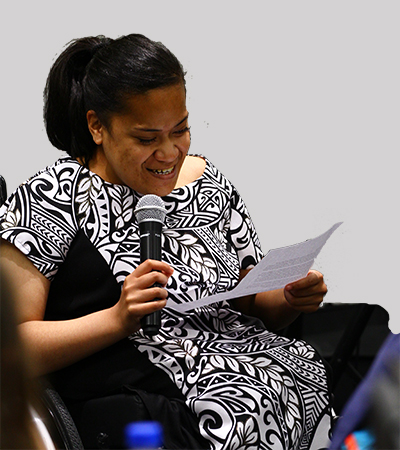
In our work to promote the independent voice of tagata sa’ilimalo on regional, national, and international issues, we:
• Develop a shared vision for tagata sa’ilimalo futures
• Foster tagata sa’ilimalo leaders and develop leadership capabilities and capacities
• Build the tagata sa’ilimalo body of knowledge and drive thought leadership on issues affecting tagata sa’ilimalo
• Provide regional hubs for tagata sa’ilimalo
• Advocate for policies that allow tagata sa’ilimalo to pursue success
• Support collaborations with the Pacific community, Māori, and other stakeholders to address the dual disparities of disability and inequity
• Offer independent advice to organisations on issues affecting tagata sa’illimalo
• Provide input into organisational strategies
• Help with co-creation of service design
• Give feedback for evaluation and monitoring of services
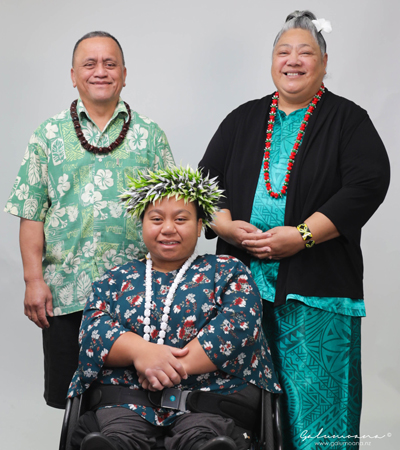
Our work prioritizes the following areas:
• Significance of the Pacific collectivist worldview
• Employment and economic opportunities
• Health and wellbeing
• Educational opportunities
• Accessible housing
• Accessible and inclusive society

● Te Tiriti o Waitangi
● The principles of Enabling Good Lives
● The New Zealand Disability Strategy
We look forward to a future where we can be guided by a national disability strategy for tagata sa’ilimalo and a code of disability rights that is designed specifically for Aotearoa New Zealand.